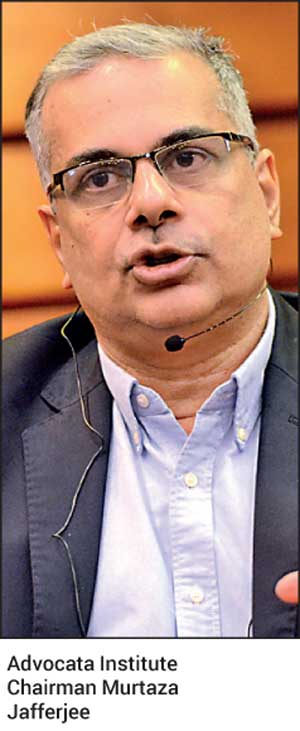Wednesday Feb 25, 2026
Wednesday Feb 25, 2026
Friday, 17 May 2024 00:58 - - {{hitsCtrl.values.hits}}
 Advocata Institute Chairman Murtaza Jafferjee last week raised concerns regar-ding the Government’s procurement of renewable energy from Adani Group without a tender process, especially when the going rate for such projects is significantly lower.
Advocata Institute Chairman Murtaza Jafferjee last week raised concerns regar-ding the Government’s procurement of renewable energy from Adani Group without a tender process, especially when the going rate for such projects is significantly lower.
During a panel discussion organised by the Central Bank titled ‘Sustaining Stability’, he highlighted the Cabinet decision on 29 April 2024 to allocate 484 MW of wind power to Adani Group in Mannar at a rate of $ 0.0826 per unit. He evaluated this with the Ceylon Electricity Board’s tender for a 50 MW project, which likely received bids at a lower rate, possibly under $ 0.06 per unit.
“For the CEB advertised 50 MW tender around 4-5 Sri Lankan companies may have had partners and it was a two envelope system. We do not know what the second envelope was for the financial proposal.
Probably, the tariff is less than $ 0.06 cents. So, why are we paying $ 0.0826 cents for an untendered project?” he asked.
Jafferjee referenced the IMF Governance Diagnostic Report, stressing the importance of competitive tendering and procurement processes to drive down costs.
He noted that Sri Lanka lacks a comprehensive procurement law, relying on guidelines. He pointed out that recent solar tenders’ yielded prices averaging $ 0.06 per unit for smaller projects, contrasting with the higher rates for larger projects awarded outside the tender process.
“Last week, 160MW of solar was tendered comprising of many 5MW or smaller projects. The average price came at $ 0.06 cents. We were awarding 400 MW projects at $ 0.086 cents. Larger sized scale, in drier areas more preferential areas in Mannar where the wind regime is higher, then the price should be going down. That is why we simply must do competitive tenders because then the price will go down eventually,” he explained.
As an engineer and economist, Jafferjee stressed the need for constraint optimisation and competition to achieve efficiency.
He highlighted that Sri Lanka’s fundamental economic challenge lies in exposing the economy to market forces and fostering competition.
Jafferjee also advocated for the introduction of Free Trade Agreements (FTA) to open up tradable sectors to competition, citing the absence of a competition commission in Sri Lanka. He emphasised that competition drives productivity improvement by incentivising cost reduction through innovation and efficiency.
In a blunt assessment of the business landscape in Sri Lanka, he highlighted the prevalent issues of patronage, rent-seeking and crony capitalism that have hindered economic progress.
He underscored the need for fundamental changes in the business environment to spur job creation and economic growth.
“Nature of business in Sri Lanka unfortunately has been focusing on patronage, rent seeking and crony capitalism,” stated Jafferjee, expressing concerns over entrenched practices that have stifled entrepreneurship and innovation.
Revealing statistics regarding the country’s labour force, he noted that it stands at 8.5 million, whilst the employable population is around 16 million. As per him, this disparity has resulted in an employment rate of only around 50%, indicating a significant gap in job opportunities.
“To address this imbalance, we need to create one million new jobs,” asserted Jafferjee, outlining a plan where one million jobs would aim to increase the labour force, while another million would focus on replacing low-productivity jobs.
He said achieving this ambitious goal would require the establishment of a large number of new firms across various sectors.
Jafferjee also noted the importance of fostering genuine entrepreneurship to drive economic growth. “We have to create something like 100,000 new entrepreneurs,” he stressed, highlighting the need for growth to stem from real entrepreneurship rather than crony patronage or rent-seeking practices.